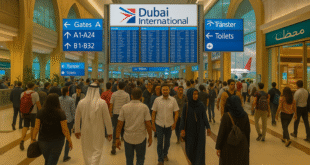I. COVID-19 Surge in Gulf Raises Regional Alarm
The COVID-19 surge in Gulf countries is back in the headlines, driven by the emergence of a fast-spreading new variant, NB.1.8.1. As cases climb across the UAE, Saudi Arabia, and Kuwait, public health experts warn that relaxed testing, low booster rates, and underreported infections may be creating a perfect storm.
In this article, we break down what’s known about the new variant, how it’s affecting the region, and what actions are being taken to contain it.
II. Understanding the Variant: NB.1.8.1
The NB.1.8.1 subvariant—linked to the Omicron lineage—has recently been identified as the main culprit behind the recent COVID-19 surge in Gulf nations. It is believed to be:
- More transmissible than previous strains
- Capable of partial immune escape
- Mild in most vaccinated individuals, but still risky for the elderly and immunocompromised
While no GCC nation has yet declared an official health emergency, there is a notable uptick in hospital admissions with respiratory symptoms.
“This wave is different—not because it’s more deadly, but because it’s spreading silently,” said Dr. Abeer Al-Jassim, a virologist based in Doha.
With testing scaled down and many relying on home kits, the true spread is likely underrepresented in official figures.
III. Key Developments Across the Gulf
📉 Drop in Booster Uptake
According to health officials in the UAE and Oman, booster uptake has dropped by over 40% since 2023. In Saudi Arabia, vaccine hesitancy remains a challenge among younger populations.
🔍 Lack of Transparent Data
The World Health Organization recently warned of data gaps across the region. Many Gulf nations stopped publicly reporting daily case numbers, hindering real-time monitoring and international coordination.
✈️ Summer Travel & Public Events
Large gatherings during Eid and summer travel season have contributed to transmission spikes, especially in Dubai, Riyadh, and Manama, which are major travel hubs.
IV. Country-Specific Impact and Responses
🇦🇪 UAE
The UAE’s Ministry of Health has ramped up mobile testing centers and urged citizens to get updated boosters. Dubai has reintroduced mandatory masking in hospitals and airports as a precaution.
🇸🇦 Saudi Arabia
Saudi Arabia has issued fresh advisories for vulnerable populations and has started reinforcing COVID-19 protocols at holy sites, given the influx of international visitors post-Hajj.
🇴🇲 Oman
Oman’s government has reactivated regional COVID-19 surveillance committees and is working closely with the WHO on genetic sequencing of NB.1.8.1 cases.
👉 Related: Saudi to Launch Digital Free Zone by Q4 2025
V. What Comes Next?
The COVID-19 surge in Gulf may not be as deadly as previous waves, but it highlights the region’s vulnerability to fast-mutating viruses and underscores the importance of proactive health governance.
As experts continue to study NB.1.8.1, GCC countries are expected to recalibrate their pandemic strategies — with renewed focus on genomic tracking, regional data-sharing, and targeted booster drives.
The takeaway? COVID isn’t over — it’s just changing its form.
 The Credible Story Trending stories that keep you hooked
The Credible Story Trending stories that keep you hooked




